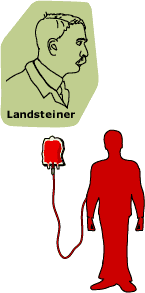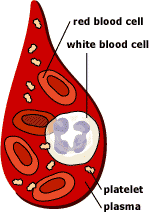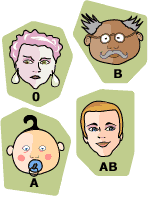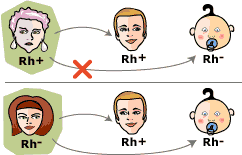Blood - Overview
- Intoduction
- Who can/can't donate blood
- Why Donate Blood
- Blood Donation Process
Blood… An introduction
Blood is the river of life that flows through the human body. We cannot live without it. The heart pumps blood to all our body cells, supplying them with oxygen and food. At the same time, blood carries carbon dioxide and other waste products from the cells. Blood also fights infection, keeps our temperature steady, and carries chemicals that regulate many body functions. Finally, blood even has substances that plug broken blood vessels and so prevent us from bleeding to death.
The amount of blood in our body depends on our size and the altitude at which we live. An adult who weighs 160 pounds (73 kilograms) has about 5 quarts (4.7 liters) of blood. An 80-pound (36-kilogram) child has about half that amount, and an 8-pound (3.6-kilogram) infant has about 81/2 ounces (250 milliliters). People, who live at high altitudes, where the air contains less oxygen, may have upto 2 quarts (1.9 liters) more blood than people who live in low regions.
|
||||||||||||||||||||||||||||||||||||||||||||||||||||||||||||||||||||||||||||||||||||||||||||||||||||||
Who can/can't donate blood
Let others benefit from your good health. Do donate blood if...
- You are between age group of 18-60 years.
- Your weight is 45 kgs or more.
- Your haemoglobin is 12.5 gm% minimum.
- Your last blood donation was 3 months earlier.
- You are healthy and have not suffered from malaria, typhoid or other transmissible disease in the recent past.
There are many, many people who meet these parameters of health and fitness!
Do abide by our rules - be truthful about your health status!
We ensure the health of blood, before we take it, as well as after it is collected. Firstly, the donor is expected to be honest about his or her health history and current condition. Secondly, collected blood is tested for venereal diseases, hepatitis B & C and AIDS.
You have to be healthy to give 'safe blood' .
Do not donate blood if you have any of these conditions
- Cold / fever in the past 1 week.
- Under treatment with antibiotics or any other medication
- Cardiac problems, hypertension, epilepsy, diabetes (on insulin therapy), history of cancer, chronic kidney or liver disease, bleeding tendencies, venereal disease etc
- Major surgery in the last 6 months
- Vaccination in the last 24 hours
- Had a miscarriage in the last 6 months or have been pregnant / lactating in the last one year
- Had fainting attacks during last donation
- Have regularly received treatment with blood products
- Shared a needle to inject drugs / have history of drug addiction
- Had sexual relations with different partners or with a high risk individual
- Been tested positive for antibodies to HIV
- Malaria (within 1 year)
- Hepatitis B, C *
- Any other type of Jaundice (within 16 years)
- AIDS
- Tuberculosis (within 2 years)
- Diabetes (are you under medication currently?)
- Fits / Convulsions (are you under medication currently?)
- Cancer *
- Leprosy or any other infectious diseases
- Any allergies (Only if you are suffering from severe symptoms)
- Hemophilia / Bleeding problems *
- Kidney disease *
- Heart disease *
- Chicken Pox (within 1 year)
- Hormonal disorders *
- Hemoglobin deficiency / Anemia (recently)
- Drastic weight loss (recently)
- Small Pox Vaccination (within the last 3weeks)
- Blood Donation (within the last 3 months)
- Blood Transfusion (within the last 6 months)
- Major Surgery (within the last 3 months)
- Pregnancy (within the last 6 months)
- Organ Transplant (within one year)
* Highly restricted.
Pregnancy and Menstrual Period
- Females should not donate blood during pregnancy
- They can donate after 6 weeks following a normal delivery and when they are not breast feeding
- Females should not donate blood if they are having heavy menstrual flow or menstrual cramps
Why Donate Blood
Blood is the part of life that is given to those who need it by those who have the resource to satisfy the need.
Your blood donation may be even more special than you realize.
A single donation from you can help one or more patients. This is possible because whole blood is made up of several useful components. These components perform special functions in your body and in the body of patients who receive your blood. The various blood components are Red Blood Cells, White Blood Cells, Platelets, Plasma and selected Plasma Proteins. Each of these components can be separated from your donated volume of blood and transfused into a specific patient requiring that particular component. Thus, many can benefit from one unit of blood.
Blood is needed every minute
- To replace blood lost because of accidents or diseases.
- To treat shock due to injury.
- For Major & Minor surgeries including open heart surgeries, transplants etc.
- For burn victims.
- For patients suffering from Anemia.
- During child birth for the mother.
- For exchange transfusion for new born infants.
- To make blood derivatives which are used to treat medical problems.
- For children suffering from ailments like Thalassaemia, Hemophilia (bleeding disorders) , Leukemia, Blood Cancer.
Blood Donation Process
Donating blood is safe and simple. It takes approximately 10-15 minutes to complete the blood donation process. Any healthy adult between 18 years and 60 years of age can donate blood. This is what you can expect when you are ready to donate blood: |
|













